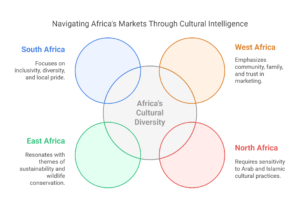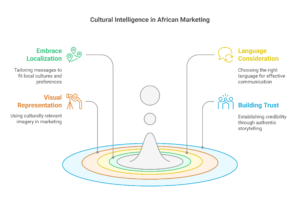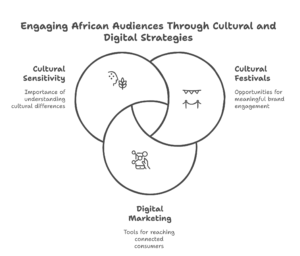Africa is renowned for its rich cultural diversity. With over 1.4 billion people speaking more than 2,000 languages and representing thousands of ethnic groups, marketing in Africa is as complex as it is rewarding. With 54 recognized countries, each with unique traditions, consumer behaviours, and communication styles, Africa requires marketers to adapt and innovate.
When creating marketing campaigns for various regions, marketers should be cognizant of several key cultural differences that are crucial for crafting effective cross-cultural strategies. Recognizing and embracing this diversity is not just important—it’s indispensable for meaningful engagement with African audiences.
In this blog, we’ll explore actionable strategies for businesses looking to navigate Africa’s vibrant and multifaceted markets, emphasizing the importance of cultural intelligence, localization, and authenticity.
Cultural Diversity: A Complex Mosaic
Africa’s immense cultural diversity is its defining characteristic. From Egypt in the north to South Africa in the south, the continent is a mosaic of ethnic groups, languages, traditions, and values. Each region has its own unique identity that influences consumer behaviour and communication preferences.
West Africa: Known for its strong community orientation, campaigns in countries like Nigeria or Ghana should emphasize family, collaboration, and trust.
North Africa: The influence of Arab and Islamic culture means that brands must be sensitive to religious practices, such as Ramadan, and align their messaging accordingly.
East Africa: In countries like Kenya and Tanzania, themes around sustainability and wildlife conservation often resonate deeply.
South Africa: With its rich blend of cultures, often referred to as the “Rainbow Nation,” South Africa offers a unique mix of influences from African, European, and Asian traditions. Campaigns here should emphasize inclusivity, diversity, and social progress. Additionally, leveraging local pride through sports (such as rugby or soccer) and iconic South African traditions like “braai” (barbecue) can create strong connections with consumers.
For brands looking to navigate Africa’s dynamic markets, understanding cultural nuances is essential. Advertising companies that invest in cultural intelligence can effectively tailor their product offerings and marketing strategies to resonate with diverse audiences. Cultural differences extend beyond messaging—they impact product design, packaging, and overall brand presentation. Businesses that adapt to these nuances will build stronger, more meaningful relationships with consumers.

The Importance of Cultural Intelligence (CQ)
Cultural intelligence is the cornerstone of cross-cultural marketing in Africa. It involves understanding and respecting cultural nuances, beliefs, and values that influence consumer behaviour. Brands that invest in cultural research and engage local experts are better equipped to avoid missteps and resonate deeply with their target audience.
For instance, a marketing campaign in Nigeria’s urban Lagos might prioritize innovation and modernity, while a campaign in rural Kenya might focus on community and tradition. Recognizing such differences can make or break your message.
Embrace Localization
A one-size-fits-all approach rarely works in Africa. Localization goes beyond language translation—it includes tailoring your message, visuals, and even product offerings to align with the preferences of each target market.
For example:
- Language: In countries like South Africa, where there are 11 official languages, choosing the right one for your campaign is critical. Swahili may work for East African countries like Tanzania and Kenya but may not resonate in Senegal, where Wolof and French dominate.
- Visual Representation: Ensure that models, imagery, and settings reflect the culture you’re marketing to. A lack of representation can alienate potential customers.

Build Trust Through Authentic Storytelling
African consumers value brands that are genuine and relatable. Craft stories that reflect the aspirations, struggles, and successes of the communities you aim to serve. Avoid stereotypical depictions or narratives that oversimplify complex cultures.
A great example of authentic storytelling is Guinness Nigeria’s “Made of More” campaign, which highlighted inspiring local heroes who embodied resilience and determination. Such campaigns build emotional connections and foster brand loyalty.
Cultural Events: Opportunities for Engagement
Africa is a land of festivals and cultural celebrations. From Nigeria’s Yoruba festivals to Ghana’s Chale Wote Street Art Festival, these events offer opportunities for brands to engage with audiences in meaningful ways.
For example, during South Africa’s Heritage Day, a campaign celebrating diversity and unity can resonate widely. Similarly, sponsoring a local event or creating a product line that aligns with cultural festivities can drive brand visibility and loyalty.
The Digital Advantage: Reaching Africa’s Connected Consumers
With Africa’s growing internet penetration and mobile-first population, digital marketing is an indispensable tool. Platforms like Facebook, WhatsApp, TikTok, and Instagram are widely used across the continent, providing a cost-effective way to reach diverse audiences.
However, digital marketing efforts must still account for cultural differences. A humorous ad that works in Kenya may fall flat in Ethiopia. Likewise, memes or slang popular in one country may not be understood in another.

Leverage Local Influencers for Authentic Engagement
Influencers play a pivotal role in shaping consumer behavior across Africa, making them valuable partners for brands looking to establish credibility and drive engagement. Collaborating with local influencers allows businesses to tailor their messaging to fit the cultural and social nuances of different markets, ensuring greater resonance with target audiences.
For example, beauty brands that have partnered with popular African makeup artists have seen tremendous success in Nigeria and Ghana. Similarly, food and beverage companies have effectively worked with lifestyle bloggers to demonstrate how their products fit seamlessly into everyday life.
The impact of influencer marketing is particularly evident in South Africa, where influencer rates vary based on audience reach. According to the newly released 2024 South African Influencer Benchmark Report, the cost of a single Instagram post ranges from R2,693 for a nano influencer to over R17,667 for a celebrity account with millions of followers. On average, brands can expect to pay R4,354 for static posts and R7,335 for reels, making influencer collaborations a compelling alternative to traditional advertising.
With 560 influencers surveyed, the report highlights that influencer marketing offers a unique advantage—blending reach with trust. Unlike conventional media placements, influencers create authentic connections with their audiences, delivering impressions that often rival traditional advertising channels
Measuring Cross-Cultural Campaign Success and Effective Implementation
To ensure the effectiveness of cross-cultural marketing campaigns in Africa, brands must adopt a data-driven approach to measurement and strategic implementation. By leveraging advanced analytics and cultural intelligence, businesses can assess campaign performance, optimize engagement, and refine messaging for diverse audiences.
Key Metrics for Evaluating Success
- Cultural Resonance Score (CRS): Measures how well a campaign aligns with local cultural values and consumer expectations.
- Implementation: Conduct surveys and focus groups within the target demographic to assess perceptions of cultural alignment.
Nike’s “Run Jozi” campaign in South Africa successfully resonated with local culture by promoting community and unity through a 10km run in Johannesburg, featuring local celebrities and themes that celebrated South African identity.
- Local Market Engagement Rates: Tracks audience interaction, including social media shares, comments, and conversions across different regions.
- Implementation: Utilize social media analytics tools to track engagement metrics segmented by region and demographics.
- Cross-Cultural Brand Equity Metrics: Assesses brand perception and trust across various cultural demographics.
- Implementation: Conduct brand awareness and perception studies within various cultural segments to determine brand equity.
- Regional Response Variations: Analyzes how different markets react to the same campaign, helping brands tailor content for maximum impact.
- Implementation: Compare KPIs such as conversion rates, sales figures, and engagement levels across different regions to identify cultural impact.
Strategic Implementation for Maximum Impact
- Cultural Immersion & Research: Invest in local market research, engage cultural experts, and use AI-powered analytics to understand audience preferences.
- Adaptive Content Strategy: Develop flexible campaign frameworks with localized messaging, visuals, and storytelling elements that align with regional traditions.
- Technology-Driven Optimization: Utilize AI for cultural sentiment analysis, predictive analytics for campaign adjustments, and automated tools for real-time cultural sensitivity checks.
By integrating these strategies, brands can create culturally relevant and high-performing marketing campaigns that resonate deeply with Africa’s diverse consumer base.
Avoid Pitfalls Through Cultural Sensitivity
Cross-cultural marketing is fraught with potential pitfalls, such as misinterpreted symbols, offensive language, or inappropriate imagery. Take time to vet your campaigns thoroughly with local teams to ensure they are respectful and accurate.
For example, using certain colours or symbols without understanding their significance can lead to unintended offense. In some cultures, direct eye contact is a sign of confidence, while in others, it may be seen as disrespectful.
Unity in Diversity
Crafting effective cross-cultural marketing campaigns in Africa requires a deep understanding of the continent’s diversity, a commitment to authenticity, and a willingness to collaborate with local experts. By embracing cultural intelligence, localization, and storytelling, brands can foster meaningful connections and achieve sustainable growth.
As Africa continues to rise as a global economic powerhouse, the opportunities for businesses are boundless. However, success will come to those who truly respect and celebrate the continent’s vibrant cultures.
At Marketing Analytics Africa (MAA), we specialize in empowering businesses with the tools and strategies needed to navigate Africa’s unique marketing landscape. Contact us today to learn how we can help you craft data-driven, culturally attuned campaigns that drive results.




